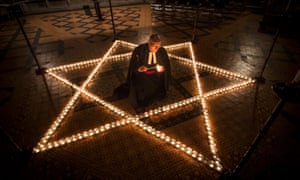Extract from The Guardian
Such a view has long been marginal, especially in the west, but on
Friday it gained a new and powerful advocate: the Trump administration.
To mark Holocaust Memorial Day, the White House issued a statement that did not mention Jews or antisemitism at all.
At first, many assumed it had been an error; an oversight by a new team that has not exactly impressed with its competence. But at the weekend, Trump spokewoman Hope Hicks confirmed that the wording had been deliberate: “We are an incredibly inclusive group and we took into account all of those who suffered,” she said. On Sunday, Trump’s chief of staff, Reince Priebus, stuck to that position, saying that the White House regarded “everyone’s suffering in the Holocaust” as “sad” and obviously that included “all of the Jewish people affected” – again implying that Jews were merely caught up in a generalised attack on all people, rather than targeted for annihilation.
One point needs to be stressed. The many Jewish groups – including ones previously well-disposed to Trump, such as the Republican Jewish Coalition – that have condemned the White House do so not because they mistakenly, or arrogantly, believe Jews were the only victims of the Nazi horror. Of course not. The Nazis were broad in their hatred, targeting Roma, gay people and disabled people, as well as socialists, communists and many others. But any full account of that period begins with the recognition that Jews were singled out for total eradication. Why would the Trump White House be resistant to acknowledging that uncontroversial fact?
There has long been a strain of thinking on the far right that says Jews and African-Americans have engaged in “special pleading” over the Holocaust and slavery for too long, and that it’s time to push back. (Naturally, white supremacist groups warmly welcomed Trump’s Holocaust statement.) Until a few months ago, such thinking flourished only on the wilder shores of the “alt-right”. But now the far-right has found a home in the White House, in the form of Breitbart publisher turned senior presidential counsellor Steve Bannon.
But there is a simpler explanation, too. This, remember, is the administration that believes in “alternative facts”, headed by a president who thinks nothing of denying the existence of visible, demonstrable evidence. That it should take a first step toward Holocaust denial is fully in character.
At first, many assumed it had been an error; an oversight by a new team that has not exactly impressed with its competence. But at the weekend, Trump spokewoman Hope Hicks confirmed that the wording had been deliberate: “We are an incredibly inclusive group and we took into account all of those who suffered,” she said. On Sunday, Trump’s chief of staff, Reince Priebus, stuck to that position, saying that the White House regarded “everyone’s suffering in the Holocaust” as “sad” and obviously that included “all of the Jewish people affected” – again implying that Jews were merely caught up in a generalised attack on all people, rather than targeted for annihilation.
One point needs to be stressed. The many Jewish groups – including ones previously well-disposed to Trump, such as the Republican Jewish Coalition – that have condemned the White House do so not because they mistakenly, or arrogantly, believe Jews were the only victims of the Nazi horror. Of course not. The Nazis were broad in their hatred, targeting Roma, gay people and disabled people, as well as socialists, communists and many others. But any full account of that period begins with the recognition that Jews were singled out for total eradication. Why would the Trump White House be resistant to acknowledging that uncontroversial fact?
There has long been a strain of thinking on the far right that says Jews and African-Americans have engaged in “special pleading” over the Holocaust and slavery for too long, and that it’s time to push back. (Naturally, white supremacist groups warmly welcomed Trump’s Holocaust statement.) Until a few months ago, such thinking flourished only on the wilder shores of the “alt-right”. But now the far-right has found a home in the White House, in the form of Breitbart publisher turned senior presidential counsellor Steve Bannon.
But there is a simpler explanation, too. This, remember, is the administration that believes in “alternative facts”, headed by a president who thinks nothing of denying the existence of visible, demonstrable evidence. That it should take a first step toward Holocaust denial is fully in character.

No comments:
Post a Comment